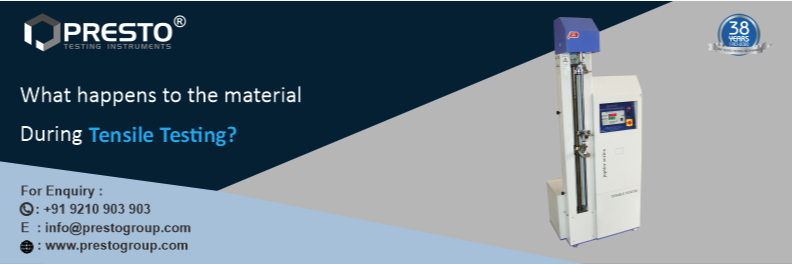

Tensile stress refers to the amount of direct load connected with stretching or tensile forces that cause the material to stretch along the axis of the applied load. Tensile tests are performed to examine the efficacy and behavior of a material when it is stretched. These tests determine the material's maximum strength or load capacity under optimal temperature and pressure conditions.
You can easily measure the tensile strength of materials with the help of the Presto tensile strength tester. This testing equipment is highly versatile for checking the breaking strength of packaging-related raw materials and finished products. Here in this blog, we will discuss the tensile strength test and what you can do when the material will experience the tensile test.
The tensile testing or tension testing of the materials is considered to be one of the most fundamental quality tests that help to determine the material’s strength and elongation. When a tensile force is applied to a material, it will ultimately break, which allows the manufacturers to get a precise and exact study of its quality. As a result, most manufacturers employ this tensile testing machine in QC laboratories and mainstream production chains to analyze materials' quality.
The primary goal of this high-quality lab testing instrument is to examine material tensile characteristics. As a result, you'll be able to conduct a material quality analysis and determine whether or not your product is safe to use. You'll be able to test the tensile strength of materials at various capacities with its large testing range and improved peak load indication for precise reading.
Presto's tensile strength tester complies with ASTM D429-73, ASTM D624, ATM D638-01, and ASTM D76, IS 13360-5-7, and IS 3400 testing standards. Most manufacturers consider using this lab testing equipment because of its wide range of uses. Whenever you conduct the tensile test using Presto tensile tester, then you need to take care of some precautions to obtain the best quality results.
Below, we have listed the features and technical specifications of the tensile strength tester.
With the usage of this best-selling testing equipment from Presto, you'll be able to deliver quality products to your customers. Below we have listed the features of this amazing testing equipment.
Optional Features:
These are the advanced features that are embedded in the digital tensile strength tester. Now, let us discuss its technical specifications.
With these features and technical specifications of the tensile strength tester, you will be able to conduct the tensile test with ease. Before conducting the tensile test, you need to prepare the testing specimen first.
Once you place the specimen accurately on this lab testing equipment then you can place it accurately on the machine. You can easily prepare a dumbbell-shaped testing specimen or rectangular one for this lab testing equipment. This best-selling testing equipment may be used to test the tensile strength of materials in a variety of sectors of different industries, including injection moulding, automotive, blow moulding, and other related industries.
We at Presto are considered to be the top tensile strength tester manufacturer that will provide you best tensile strength tester price. You can easily give us a call at +919210 903 903 or email us a query at info@prestogroup.com to know more about this lab testing instrument.
Connect with us for your business enquiries. Generally, we respond within one or two working days.